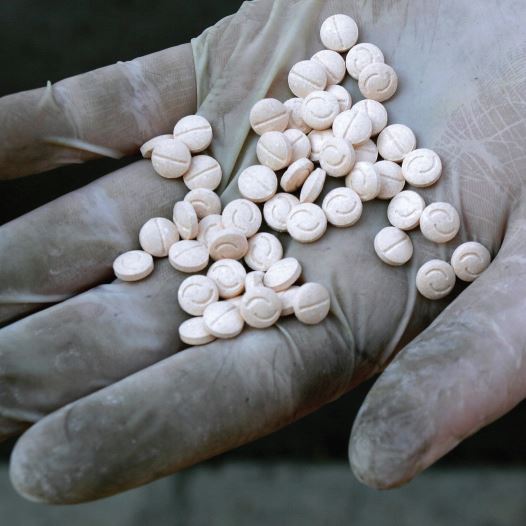Syrian drug flow into Middle East may be outside Assad’s control
As Syria officially reintegrates back into the Arab League, fellow members are expecting President Bashar Assad to wind up the extensive illegal drug flow from Syrian territory into Jordan, the Gulf states, and other Middle Eastern countries.
Western and most Arab states alike trace the smuggling of Captagon, an illegal, highly addictive amphetamine, back to Syrian territory. With Syria newly restored to the Arab League—more than a decade after it was booted out over its brutal repressions of pro-democracy activists—the influential organization of Arab leaders is expecting it to act to halt the flow.
Captagon is in abundance
Captagon is abundant in the Middle East, Ashwath Komath, a geopolitical analyst with a private risk consultancy firm, told The Media Line.
“Captagon is often smuggled through more sophisticated means through shipments of goods and on a larger scale,” he said. “Captagon smuggling is almost unparalleled in terms of street value.”
He said the scale of smuggling of other illicit drugs, such as marijuana, does not compare to the scale of Captagon.
 A customs officers displays confiscated Captagon pills (credit: REUTERS)
A customs officers displays confiscated Captagon pills (credit: REUTERS)First manufactured in 1961, Captagon usually comes in the form of pills. It was originally used as an alternative to amphetamines and methamphetamines to treat hyperactivity, attention deficit disorders, and depression. In 1981, doctors determined that its addictive properties exceeded its clinical benefits, and by 1986, it was illegal in every country. Currently, it is produced illegally and consumed mostly by young people in the Middle East and some parts of Europe.
Katrina Sammour, a security analyst based in the Jordanian capital Amman, told The Media Line that a Jordanian precondition for normalization with Syria was that Assad had to deal with the drug flow.
“Stabilization and border security are the incentives for the rapprochement [between Jordan and Syria]. Without that, Jordan needs to protect its borders on its own,” she said. She added that recent Jordanian air strikes on Syria had killed one of the most important drug dealers in the country and “show Jordan’s seriousness.”
For other affected Arab countries, the matter is less urgent. “While some countries like Jordan are more hardline, in the sense that they would like to make Syria’s re-entry conditional upon having made strides in combating narcotics, countries like Saudi Arabia are more relaxed in their stance,” Komath said.
Sammour said that for Assad the question of whether to deal with the drug issue comes down to a simple cost-benefit equation. “Would he earn more through narcotic trafficking or rapprochement with the region? With reconstruction talks, it is already clear that the regional dialogue will be more beneficial,” she said.
Still, halting the drug trade could be difficult for Assad, she said. Although the trafficking networks are extensive in Syria, their sources are in Lebanon. Sammour said Assad needs to focus on those sources.
“There are several factories set up by Hizbollah and affiliates in southern Syria, mainly for Captagon, with some producing crystal meth [crystal methamphetamines],” she said. It would be a challenge for Assad to control the flow of narcotics and raw materials from Lebanon to Syria while maintaining good relations with Hizbollah and its affiliates in Syria.
Sammour said that people in Assad’s close circle were involved in the drug flow.
“Evidence shows that the Fourth Armored Division led by Maher al-Assad [the president’s brother] and Hizbollah are the main culprits. The tactics and weaponry used in trafficking would also indicate official or semi-official cover,” she said.
Komath said: “The true size of the drug trafficking networks is unknown. Many of these networks reportedly enjoyed state patronage to some extent, as Syria exhausted most of its productive capacity during the war and was accepting narco-payments to run the state.”
Given the indications that narcotics production in Syria also involves some of the Syrian leadership, Komath said the problem may have evolved into a size out of Assad’s control.
“I don’t see Assad being able to comprehensively address the problem, at least in the short term,” Komath said. “[By eradicating the trafficking,] the state will lose out on an important source of income that allowed the government to remain afloat, and also involve influential Syrians.”
But he said that Assad does not need to stop the drug flow completely to satisfy the other Arab leaders. “He merely has to show efforts that he is trying to do so. So in the coming months, there might be an increase in the number of seizures of drug shipments within Syria, or they might be more willing to share information about narcotics flows when it reaches other countries like Jordan or Saudi Arabia,” he said.
In any case, he said that the chances of the Arab countries backtracking on normalization with Syria remain low, as that would undermine progress on other issues and interests. However, an evident lack of Syrian cooperation could be an obstacle to further normalization, he said.





Comments are closed.